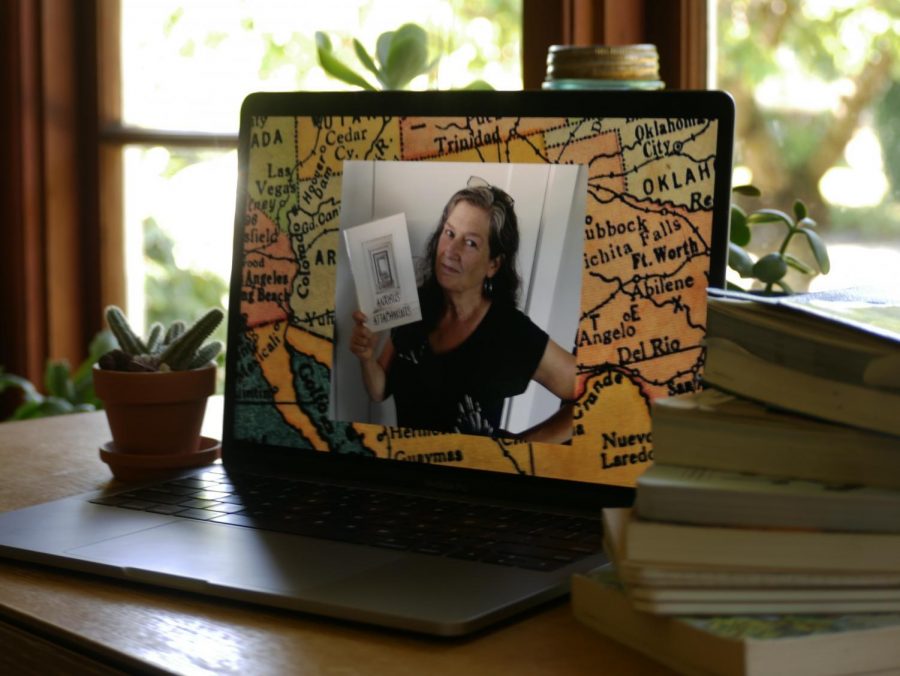OSU-Cascades professor wins Oregon Book Award for Creative Nonfiction
August 13, 2020
As Oregon State University-Cascades faculty author Beth Alvarado listened to the radio broadcast with a glass of wine in hand on her back porch, she certainly was not expecting her own book, Anxious Attachments, to be announced as an award-winner.
Her book won the 2020 Oregon Book Award for Creative Nonfiction by Oregon Literary Arts. This news had caught Alvarado by surprise, because it hadn’t been just “another book” this time, but her very own, and the usual day had turned unusual all of a sudden. Taking her dog for a walk had been for celebration rather than consolidation. Alvarado then proceeded to text her friends and family to share the news, though the announcement, for her, did not sink in until days later.
Anxious Attachments consists of 14 essays that gives the reader a glimpse into life in the American Southwest from the 1970’s to the present. The title comes from the thread of these stories that are sewn together about Alvarado’s attachments to people, her ensuing anxiety and the nature of events that are often beyond human control, then finally, the way that these expand to roots traced back deep in social issues and the environment. They are much like concentric circles, an analogy that Alvarado makes.
Alvarado’s interest in writing creative nonfiction sparked when she taught the subject at the University of Arizona while simultaneously being the editor of an anthology of contemporary literature that encompassed creative nonfiction. Prior to this, she also obtained a Master of Fine Arts in fiction writing from the U of A.
The difference between writing fiction and nonfiction, according to Alvarado, lies in inventing experiences versus unearthing memories that already exist.
“In nonfiction, I usually begin with something that causes me cognitive dissonance and then I explore it through research and memory,” Alvarado said via email. “In fiction, you get to invent what you need as you go, but in nonfiction, all of your experience is already there, and so you pare down the details until you can see the matter more clearly. It’s like sculpting. Plus, in nonfiction, you have a contract with the reader to be as faithful as you can to reality and to memory.”
Throughout the writing process of Anxious Attachments, Alvarado said she was supported by pillars of friendship, especially the Eat with Writers group formed by fellow writers and friends including Brigitte Lewis and Irene Cooper—both of whom she’d met in the OSU-Cascades MFA program five years ago. Lewis and Cooper recount heartfelt meetings where they shared their work with each other over a table of food. Anxious Attachments was no exception to this. Polishing of the book was aided by the group’s critical discussions and insightful feedback, and they’d even helped Alvarado consider designs for the cover. Neither Lewis nor Cooper said they had been surprised upon hearing about Alvarado’s receival of the award. Indeed, they said they were happy for her and thought the recognition was well deserved.
“I think Anxious Attachments and its birthing process contributed hugely to our becoming our own mutually supportive, creative community, where we imagined our collective energy and successes through the lens of Beth’s beautiful book,” Cooper said via email.
Not only did Lewis and Cooper help Alvarado revise her work, but the reverse occurred as well. Lewis compliments Alvarado on her skill of organizing and rearranging written work, and students and coworkers alike have worked closely with Alvarado.
“Beth is an astute reader,” Lewis said via email. “I am certainly referring to her ability to read and respond to student work and the work of established writers, but I also mean to say that she reads the world, its people and its situations well. I think this allows her to spot things that don’t belong in or are detracting from a piece of writing. It also allows her to do a kind of mental rearranging with ease.”
With the help of the Eat with Writers group, the three friends will all have books coming out this fall—Cooper’s novel Committal, Lewis’s chapbook Origin Stories and Alvarado’s book of short stories Jillian in the Borderlands.










































































































